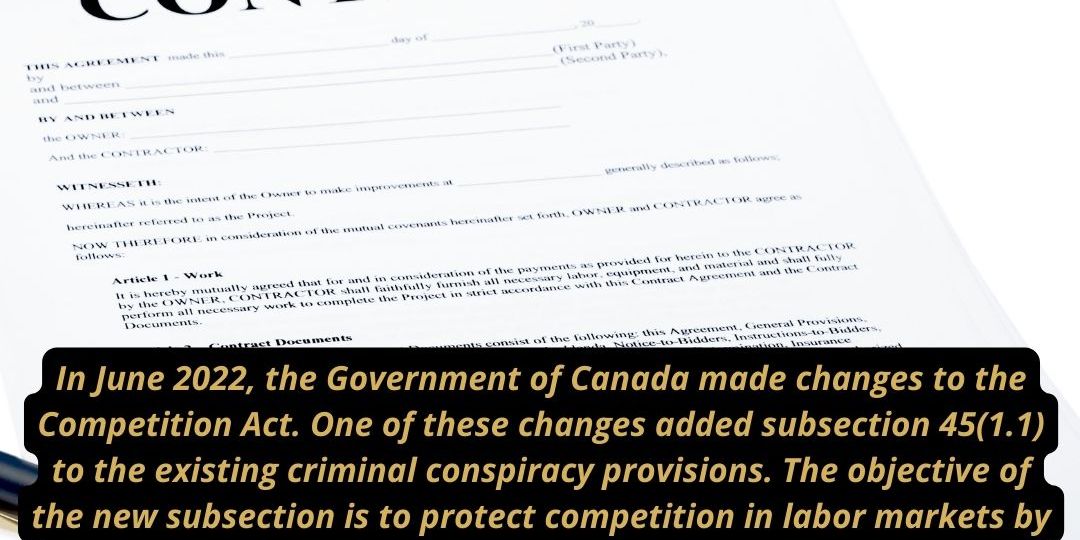
In June 2022, the Government of Canada made changes to the Competition Act. One of these changes added subsection 45(1.1) to the existing criminal conspiracy provisions. The objective of the new subsection is to protect competition in labor markets by prohibiting agreements between employers to fix wages and restricting job mobility.
The new subsection provides as follows:
45 (1.1) Every person who is an employer commits an offence who, with another employer who is not affiliated with that person, conspires, agrees or arranges:
(a) to fix, maintain, decrease or control salaries, wages or terms and conditions of employment; or
(b) to not solicit or hire each other’s employees.
Inadvertently, part (b) of this new provision caused some confusion, specifically with regard to the scope of no-poaching agreements. What did it mean for employees looking to change jobs? Did it render non-solicit clauses in employment agreements illegal? Can employers even have such a clause in employment agreements anymore?
A generic non-solicitation clause in an employment agreement usually reads as follows:
“During and for a period of [X] months following the termination of employment, the Employee agrees not to directly or indirectly solicit, recruit, induce, or encourage any current employees, clients, partners, or collaborators of the Employer to terminate their relationship with the Employer or to enter into any business arrangement with any other entity, whether as an employee, contractor, client, partner, or otherwise.”
If this made you quickly check the non-solicitation clause in your employment agreement, read on.
Differentiating between anti-competitive clauses and non-solicit clauses
The objective of Section 45 (1.1)(b) is to target anti-competitive agreements among competitors (between two employers), and not agreements between an employer and its employees. The intention is to prevent competitors colluding by way of wage-fixing or signing no-poaching agreements that ultimately result in restricted job mobility for employees. Through this legislation, the Competition Bureau is looking to maintain and encourage competition among employers that results in higher wages, salaries, benefits and opportunities for employees.
This has little to do with a general non-solicit clause. A non-solicitation clause simply prevents an employee from approaching the employer’s clients or other employees to move over to their company. The objective of this clause is to protect the employer against losing staff or customers to an employee who leaves the company.
Another thing to keep in mind is that the Bureau recognizes the significance that labor-related restraints can play in many business agreements. Reasonably necessary restraints are important to stabilize and protect a party’s business interests in the course of advancing legitimate objectives.[1]
To be clear, most general non-solicit clauses in an employment agreement are not anti-competitive (this may vary, of course, based on the fine-print of each unique agreement). However, it is worth keeping in mind that when assessing the applicability of a non- solicit clause, the Courts in Alberta consider any “restrictive” clause to be prima facie unenforceable (such as non-competes or non-solicit clauses), unless the employer can prove that it is reasonable. Reasonableness is assessed in context of the parties and the public’s interest. This is because the Courts usually lean towards protecting employees due to the power imbalance in an employer-employee situation.
So, for a non-solicitation clause to be enforceable, it needs to meet a minimum standard:
In Alberta, the legal test for a reasonable and enforceable non-solicit clause:
1. The clause shouldn’t be too restrictive.
2. The clause shouldn’t be too broad in scope.
3. The clause should list the prohibited activities.
4. The clause should have a reasonable time frame.
You might want to pick up your employment agreement and evaluate it in light of the above legal test. Does it still appear problematic? If yes, reach out to our team at Osuji & Smith Lawyers today to review your employment agreement for you and advise you of next steps.
[1] Enforcement Guidelines on wage-fixing and no poaching agreements (canada.ca)
Author: SHIKHA SHUKLA

